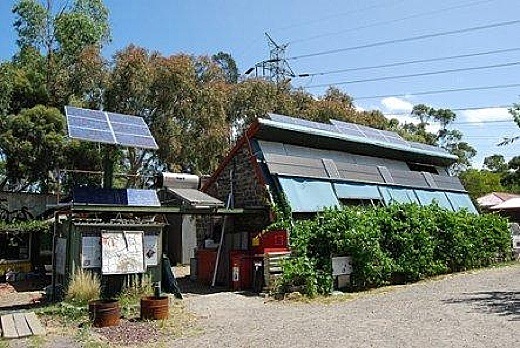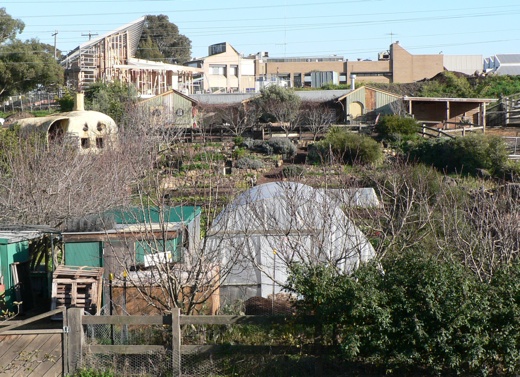 Image above: A CERES urban farm photo from article.
By Niall Fahy on 23 November 2009 in Reality Sandwich -
(http://www.realitysandwich.com/urban_farming_revolution)
Image above: A CERES urban farm photo from article.
By Niall Fahy on 23 November 2009 in Reality Sandwich -
(http://www.realitysandwich.com/urban_farming_revolution)
An Australian sustainability collective has come up with a novel approach to bringing ecological organic food production into our cities. Their design is fast, efficient, cheap, demountable, and scalable. Welcome to the urban farming revolution proposed by CERES.
Cities, in the normal scheme of things, suck inordinate amounts of resources from the surrounding countryside. They are massive energy sinks, guzzling power and food while producing tonnes of carbon dioxide and waste. Moreover, the city limits demarcate a perceived division between synthetic and natural -- between the high speed sophistication of modern civilization and the relative placidity of agrarian life. We often tend to think that in our living arrangements one has to largely forsake one's connection to either culture or nature.
Climate change and the approach of peak oil will demand localization of food and energy production. With this in mind, CERES (the Center for Education and Research in Environmental Strategies) -- a community based model of sustainable society in the metropolis of Melbourne, Australia -- plans to build a number of modular high-density organic farming hubs on disused pieces of land throughout the city.
These intensive urban mini-farms are designed to be highly productive, energy efficient, customizable, and cheap to build using shipping containers and plastic poly-tunnels. Incorporating aquaponic vegetable cultivation, fish farming, mushroom production, beehives, and a food processing and distribution service, the farms are designed within the permaculture ethos of mimicking nature's flows. The waste of one process becomes fuel for the next, and each stage of the process yields a product.
Aquaponic farming means that water (rather than soil) is used as a medium in which to grow plants. In an urban setting, this solves the all-too-likely issue of soil contamination due to industrial pollution. In the CERES model the aquaponic system will be fertilized using water pumped from the fish farm beneath, which is rich in nutrients from their waste. The fish are fed vegetable scraps and worms grown in mushroom compost. Root systems of tomatoes, cucumbers, eggplants, leafy greens, strawberries, sprouts, and herbs will in turn clean the water before it recirculates to the fish.
Biodigesters that can decontaminate organic waste and turn it into usable energy are another potential component of this rapid-turnover design, as are solar panels and a water harvesting system. The food distribution area -- which will operate as a co-operative -- could also function as a café, education center, and community social space. As no permanent structures are built, the need for planning permission is eliminated, making the hubs easier to implement and also more palatable to any property developers or government bodies that may end up being involved.
One of these farms can be set up within a week, and the first will be installed in Melbourne in early 2010. The project's proponents want this to be the first of many, and are talking to the local Office of Housing and Schools, seeking pieces of land that will be available for as little as three years. And they can't wait to see what people around the world will do with their idea. In the spirit of emerging P2P information-sharing paradigms such as that of Missouri's Open Source Ecology, the hubs will be intended to inspire people all over the world to follow suit and refine the designs to fit their own local needs.
Given sufficient opportunity, the concept could provide a significant portion of the city's food while providing education and employment for hundreds of urban farmers and installers. Through being empowered in this way, communities can become more self-sufficient, not to mention happier. Chris Ennis, organic farm manager and co-designer of the hub scheme, told me that "I see people light up when they're participating in meaningful work like this. Helping to feed your neighbors is a worthwhile thing to do."
 Image above: CERES 10 acres site in Brunswick East, Victoria, Australia.
From http://en.wikipedia.org/wiki/CERES_Community_Environment_Park
Image above: CERES 10 acres site in Brunswick East, Victoria, Australia.
From http://en.wikipedia.org/wiki/CERES_Community_Environment_Park
CERES has always been about demonstration and inspiration. Started 25 years ago on the site of a former garbage dump, it is now a green haven in the midst of the city that is visited by 70,000 schoolkids and 400,000 adults every year. The 10 acre center runs on renewable energy, is a 55 tonne carbon sink, conserves and recycles its water and waste, grows organic food, and teaches diverse audiences about socially and environmentally conscious ways of living.
Central to the concept is that sustainability initiatives are located in a participatory social setting. At CERES this entails community arts and music festivals, an organic garden and market/food co-op, a plant nursery, a bicycle workshop, a café, community and school gardens, an energy park, weekly sweat lodges, and numerous experiential education programs.
It began with the dream of a few progressive community thinkers, to create a place that would demonstrate principles of sustainability and social equity, in an atmosphere of community participation. They chose the name Ceres (pronounced "eries") -- that of the Roman goddess of agriculture. Since those humble beginnings the project has grown to employ 200 people and is an incorporated Not For Profit organization governed by a Committee of Management. The group's website describes their story as an evolutionary journey, acknowledging the interconnectedness of everything from our breath to the trees, to the stars formed in the Big Bang, to the Wurundjeri -- original inhabitants of the land upon which the undertaking stands.
There is no pollyanna-esque naiveté at work here; the organization's literature acknowledges the gravity of our present global situation and the crucial need to change the underlying value system that has produced such hideous disparity between rich and poor, such abominable destruction of the natural world. The CERES website states that they are "committed to redefining purpose, values, success and happiness in terms of the wellbeing of our relationships with one another and the environment. We see this as the bedrock on which to build a new way of being now and for the future. Here our needs are fulfilled as a natural outcome of our enhanced relationships with each other and the earth. Here our wants are aligned with the inherent nature of the earth to unfold in complexity, diversity and beauty."
Modern social and ecological activism is evolving. Efforts to change the status quo -- when practiced in a self-righteous or condemnatory tone -- often serve to divide and fragment rather than unite and heal. Through demonstrating positive and creative ways of living for anyone who cares to stop by, CERES have found that they "ignite and support people's passions for a better world."
The vision is that sustainability need not entail a return to antiquated ways of living, but can merely mean the incorporation of innovative technology into a respectfully treated environment. This sharing of their aspirations for urban farming is one way they hope to tap into the global community's yearning for reconnection with the Earth, feed their neighbors, and help to make our cities places where nature is not absent.
See also: Ea O Ka Aina: Urban Farming is the future 8/18/09 Ea O Ka Aina: How Cuba survived Peak Oil 9/10/09 Ea O Ka Aina: City farming with livestock 9/27/09
1 comment :
This article is a vision I can see being manifested on the blessed island of Kaua'i. It is refreshing and inspiring to read of others taking such bold and harmonious actions to honor our presence here on this planet. I truly believe that a similar setup will be created in the future on Kaua'i and I would be delighted to be a part of making that happen.
Mahalo yo,
~Joe
Post a Comment